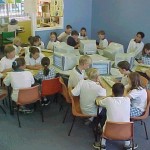 I wrote recently about a new project using augmented reality to help students learn STEM subjects. The platform aims to help children learn STEM via a mixture of experimentation and gamification. The goal of the platform is to make learning fun and akin to playing a game.
I wrote recently about a new project using augmented reality to help students learn STEM subjects. The platform aims to help children learn STEM via a mixture of experimentation and gamification. The goal of the platform is to make learning fun and akin to playing a game.
“Many students think of learning as boring, monotonous lectures with stacks of homework or textbooks. There are no alternatives for students who don’t enjoy or exceed with that kind of learning,” the team say. “If Explore! Interactive can spur positive emotions toward learning at an early age, we can inspire so many kids to do so much better later in their lives. We want to help promote inspiration in children as they learn.”
Social learning
A recent study from the University of Kansas suggests that social media can be equally beneficial. The team developed a curriculum unit to help ninth-grade biology students learn about scientific argumentation via social media.
The benefit typically derived due to the way students used social media to share their scientific claims and discuss them with both teachers and peers. The social nature of such activities helped to internalize the knowledge, which in turn resulted in them scoring higher on a post-study test than peers in a control group, both on the knowledge they had and also on their confidence in arguing their case.
“I’d say one of our biggest findings was that topics had to be authentic, and social media brought interactivity to the classroom that would otherwise have been nonexistent due to time, distance and schedule demands,” the team say.
In addition to the students benefiting from the use of social media, so too did the teachers. Those involved in the experiment ended up collaborating with peers in other schools, comparing notes on the unit, sharing tips and resources on how best to engage the students.
“It really became professional development for the teachers, as well,” the researchers explain. “Not all of them were social media advocates when we began. It was great helping the teachers make those connections.”
Suffice to say, in addition to providing instruction on the science itself, the unit also gave students advice on how best to conduct oneself online, something which should prove useful even outside of the classroom.
With schools still teaching in much the same way they have for a hundred years or more, it’s nice to see a bit of experimentation in how material is communicated with students. The authors are confident that the lessons gleaned from the project can be applied widely.
“The unit was developed with teachers and focused on scientific argumentation from day one, and gave students more chances to practice via social media,” they explain. “The underlying pieces we found apply across social media platforms. The basic philosophies are what we hope they carry on. Kids are the digital citizens of today, but sometimes they need a reminder on how to appropriately use these mediums. It’s more than just a lesson on science content, it’s putting good digital citizenship into practice.”